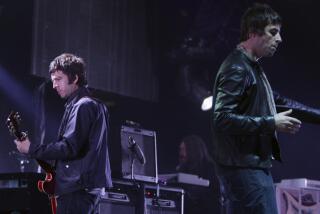Collins Stages Revolt Against Ticket Brokers
Phil Collins has recorded tons of hit songs, made goofy rock videos and even starred in a movie. But now, the pop star has embarked on his biggest career challenge yet--he’s taking on L.A.’s powerhouse ticket brokers.
For years, rock fans have complained that brokers consistently have access to many of the best concert tickets, which are in turn sold to wealthy professionals and show-biz types, at prices far beyond the means of the rank ‘n file fan.
Now Collins has devised a unique plan to freeze out local brokers. He’s selling concert seats--but without actually giving fans the tickets until the night of the show.
For his concert last Monday at the Wiltern Theatre, Collins, Bill Graham Productions and Avalon Attractions put tickets on sale only 24 hours before the concert--and then only sold one randomly assigned ticket to a customer.
“You had to bring a photo ID and fill out a form where you signed your name,” explained Graham talent buyer Sherry Wasserman. “We kept the first part of the form and gave fans a receipt. But the receipt wasn’t any good unless they brought the receipt--and their photo ID--with them to the box office Monday night to pick up their ticket. Once we gave them the ticket, they had to enter the building. No one who left afterwards could come back in.”
According to Wasserman, fans who lined up Sunday bought 1,500 of the Wiltern’s 2,200 available seats--at $25 a ticket, with an extra $2 service charge going to the Wiltern. The rest were sold Monday through Ticketmaster, which tacked a steep $5 service charge on its ticket sales. (Collins’ manager Tony Smith didn’t return Pop Eye’s calls, but Wasserman said that Collins kept 100 tickets to give friends and associates--considerably fewer than normal. All proceeds from the concert went to the Los Angeles Homeless Health Care Project.)
“In the future, we’d probably sell two tickets to a fan, because someone like Phil is really a date-night artist,” said Wasserman. “But everything went smoothly. We had eight people checking receipts so there were no lines outside Monday. Everything went very quickly.
“The key thing is that we’re taking the tickets out of the brokers’ hands. They don’t have anything saleable to sell. I’ve already talked it over with Bill Graham and when we have the blessing of another artist, we’ll do it for other upcoming shows.”
Of course, getting another artist’s commitment may not be easy. The reaction from many managers to the latest anti-broker offensive was mixed at best.
“I can’t imagine that working in a big hall--it’s too impractical,” said Cliff Burnstein, who co-manages Def Leppard and Metallica. “It would take six hours for everyone to get into the arena. A lot of my bands’ fans don’t have cars, so their mothers would have to drive them down to stand in line for tickets--and then back again for the show.”
“It’s just too convoluted and complicated,” said Arnold Stiefel, who manages Prince and Rod Stewart. “You’d need 30 box-office windows just to check everyone’s IDs. People would be arriving at 6 p.m. and they’d be lucky to have the show go on by midnight.”
“We think it’s a really intriguing approach, especially for a smaller venue,” said Martin Kirkup, who with Steve Jensen manages Brian Ferry, Joe Jackson and the B-52’s. “It’s a real contribution to solving the problem of getting tickets to your true fans. In fact, if one of our artists is playing similar-sized halls soon, we’d consider doing something like this.”
Brian Harlig, head of the Good Time Tickets agency, says he sold “about 12 seats” to the concert, though he acknowledged they were probably obtained through Ticketmaster. “I still think it’s an exercise in futility,” he said. “It’s interesting that it wasn’t an instant sell-out because it just makes it too difficult for fans to get the tickets.”
Wasserman insists the anti-broker move is workable, even in bigger halls. “We could take the best 2,000 seats--the ones the brokers make the most profits from--and sell them, using our receipt system, to the real fans. That way you wouldn’t have everybody lining up for their tickets the night of the show. When you’re dealing with the brokers, who are very smart and manipulative, you need extraordinary measures to beat them.”
More to Read
The biggest entertainment stories
Get our big stories about Hollywood, film, television, music, arts, culture and more right in your inbox as soon as they publish.
You may occasionally receive promotional content from the Los Angeles Times.










